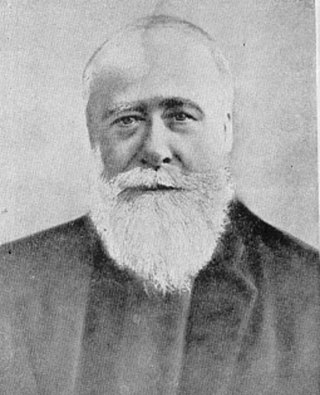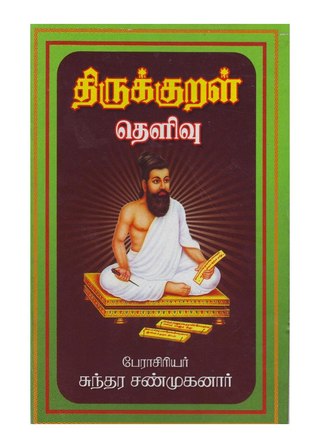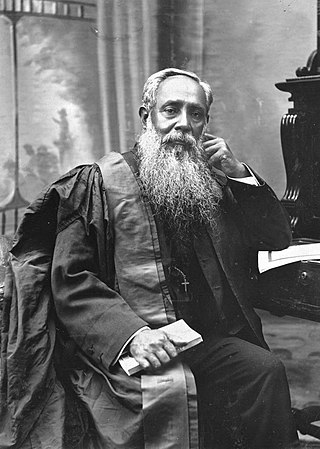
Edward Jewitt Robinson was a 19th-century Protestant missionary to British India. He is best known as one of the earliest translators of the Tirukkural into English.

Edward Jewitt Robinson was a 19th-century Protestant missionary to British India. He is best known as one of the earliest translators of the Tirukkural into English.
Edward Jewitt Robinson was a missionary of the Wesleyan Methodists in Ceylon. [2] : 48 Robinson published a collection of ancient Tamil texts, including the Tirukkural, translated into English in 1873. The work was titled Tamil Wisdom. Facilitating the evangelical works of the missionaries like Constanzo Beschi, Ziegenbalg, and Percival, Robinson published an enlarged version of the work under the title Tales and Poems of South India in 1885. In the preface of his second work, he acknowledged the earlier translations by F. W. Ellis, W. H. Drew, Karl Graul and Charles E. Gover. [3]
Robinson, like other earlier missionaries, translated only the first (Aram) and second books (Porul) of the Kural text, translating 108 chapters (1080 couplets) in verse. He did not translate the third book (Inbam). His English contemporaries greatly praised his verse translation, although native scholars of later years, such as T. P. Meenakshisundaram, had some reservations about its fidelity to the original. [3]
George Uglow Pope, in his preface to The Sacred Kurral, felicitated Robinson thus: [4]
Since this work was sent to the press, I have seen a charming little volume entitled, Tales and Poems of South India, from the Tamil, by Rev. E. J. Robinson (T. Woolmer, 1885). Had I known of this earlier, I should have felt it less necessary to publish a translation.
Robinson published Hindu Pastors: A Memorial in London in 1867, when he was with Late Wesleyan Missionary in Ceylon.[ citation needed ] His other works include:

Thiruvalluvar, commonly known as Valluvar, was an Indian poet and philosopher. He is best known as the author of the Tirukkuṟaḷ, a collection of couplets on ethics, political and economic matters, and love. The text is considered an exceptional and widely cherished work of Tamil literature.

George Uglow Pope, or G. U. Pope, was an Anglican Christian missionary and Tamil scholar who spent 40 years in Tamil Nadu and translated many Tamil texts into English. His popular translations included those of the Tirukkural and Thiruvasagam.

The Tirukkuṟaḷ, or shortly theKural, is a classic Tamil language text consisting of 1,330 short couplets, or kurals, of seven words each. The text is divided into three books with aphoristic teachings on virtue (aram), wealth (porul) and love (inbam), respectively. It is widely acknowledged for its universality and secular nature. Its authorship is traditionally attributed to Valluvar, also known in full as Thiruvalluvar. The text has been dated variously from 300 BCE to 5th century CE. The traditional accounts describe it as the last work of the third Sangam, but linguistic analysis suggests a later date of 450 to 500 CE and that it was composed after the Sangam period.

The introduction and early development of printing in South India is attributed to missionary propaganda and the endeavours of the British East India Company. Among the pioneers in this arena, maximum attention is claimed by the Jesuit missionaries, followed by the Protestant Fathers and Hindu Pandits. Once the immigrants realized the importance of the local language, they began to disseminate their religious teachings through that medium, in effect ushering in the vernacular print culture in India. The first Tamil booklet was printed in 1554 in Lisbon - Cartilha em lingoa Tamul e Portugues in Romanized Tamil script by Vincente de Nazareth, Jorge Carvalho and Thoma da Cruz, all from the Paravar community of Tuticorin.
The Tirukkural, shortly known as the Kural, is a classic Tamil sangam treatise on the art of living. Consisting of 133 chapters with 1330 couplets or kurals, it deals with the everyday virtues of an individual. Authored by Valluvar between the first century BCE and 5th century CE, it is considered one of the greatest works ever written on ethics and morality and is praised for its universality and non-denominational nature.
Tirukkural, also known as the Kural, an ancient Indian treatise on the ethics and morality of the commoner, is one of the most widely translated non-religious works in the world. Authored by the ancient Tamil poet-philosopher Thiruvalluvar, the work has been translated into 57 languages, with a total of 350 individual translations, including 143 different renderings in the English language alone.
William Henry Drew was a 19th-century Christian missionary to India who rendered the Tirukkural into English. However, he translated only the first 630 couplets of the Tirukkural.

John Lazarus (1845–1925) was a Christian missionary to India who rendered the Tirukkural into English. He revised the work of his predecessor William Henry Drew, who had already translated the first 63 chapters of the Tirukkural, and translated the remaining portion of the Kural text.

Tirukkural remains one of the most widely translated non-religious works in the world. As of 2014, there were at least 57 versions available in the English language alone. English, thus, continues to remain the language with most number of translations available of the Kural text.

Latin is the first foreign language into which the Tirukkuṟaḷ was translated. There are three known translations of the Kural text available in Latin.
K. M. Balasubramaniam was a Tamil writer and supporter of the Dravidian Movement, and a translator of the Tirukkural into English. He came to be known as Thiruvachakamani for his translation of Manikkavacakar’s Thiruvasagam into English before translating the Kural text.
As of 2015, the Japanese language has two translations available of the Tirukkural.
Herbert Arthur Popley was a Christian missionary of London Mission, Erode, known for his literary work as a translator of the Tirukkural and his skill in rendering Tamil Christian music in the Carnatic style. He was secretary of the All-India Y.M.C.A. At the time of his death, he was president of the local Y.M.C.A. and a director of the Coonoor Co-operative Urban Bank Ltd. He died in Coonoor on 9 May 1960 at the age of 81.
S. M. Michael was one of the early 20th-century translators of the Tirukkural into English.
A. Chakravarti, who served the Indian Educational Service (IES), was a professor of philosophy at the Presidency College in Chennai, India. He is known for translating the Tirukkural into English.
Emmons E. White (1891–1982) was a Christian missionary in South India. He is best known for his work on Tamil music and his English translation of the Tirukkural.
E. S. Ariel, also referred to as Monsieur Ariel by his contemporaries, was a 19th-century French translator known for his French translation of the ancient Indian philosophical text of the Tirukkural. He translated select couplets of the Tirukkural into French in 1848 and published it in Paris under the title Kural de Thiruvalluvar . Although the first French translation of the Kural text was made by an unknown author in 1767, which Ariel had mentioned in his work, it was Ariel's translation that brought the ancient work to the French world.
Tiruvalluva Malai is an anthology of ancient Tamil paeans containing fifty-five verses each attributed to different poets praising the ancient work of the Kural and its author Tiruvalluvar. With the poets' time spanning across centuries starting from around 1st century CE, the collection is believed to have reached its present form by 10th century CE. With the historical details of the ancient philosopher and his work remaining obscure, much of the legend on the Kural and Tiruvalluvar as they are known today are chiefly from this work. The collection also reveals the name of the author of the Kural text as 'Tiruvalluvar' for the first time, as Tiruvalluvar himself composed the Kural text centuries earlier without indicating his name anywhere in his work. Reminiscing this, E. S. Ariel, a French scholar of the 19th century, famously said of the Tirukkural thus: Ce livre sans nom, par un autre sans nom.
The Book of Inbam, in full Iṉbattuppāl, or in a more sanskritized term Kāmattuppāl, also known as the Book of Love, the Third Book or Book Three in translated versions, is the third of the three books or parts of the Kural literature, authored by the ancient Indian philosopher Valluvar. Written in High Tamil distich form, it has 25 chapters each containing 10 kurals or couplets, making a total of 250 couplets all dealing with human love. The term inbam or kamam, which means 'pleasure', correlates with the third of the four ancient Indian values of dharma, artha, kama and moksha. However, unlike Kamasutra, which deals with different methods of lovemaking, the Book of Inbam expounds the virtues and emotions involved in conjugal love between a man and a woman, or virtues of an individual within the walls of intimacy, keeping aṟam or dharma as the base.

Avvaiyar was a Tamil poet who lived during the Sangam period and is said to have had cordial relations with the Tamil chieftains Vēl Pāri and Athiyamān. She wrote 59 poems in the Puṟanāṉūṟu. A plaque on a statue of the poet in Chennai suggests the first century BCE for her birthdate. The name Avvaiyar means a 'respectable good woman', hence a generic title; her personal name is not known.